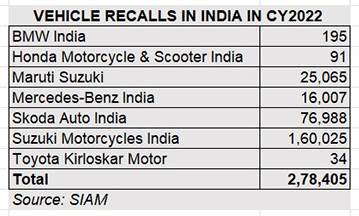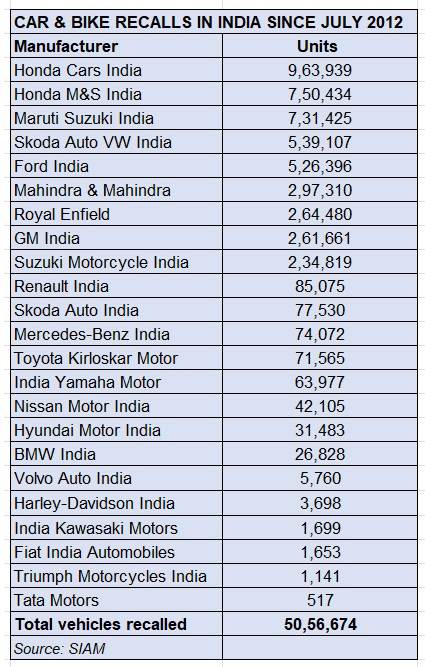As the first month of CY2023 draws to a close, it has already seen two carmakers issue a recall for a total of 29,939 vehicles, which is 11% of the total vehicles recalled in the Indian automobile market in CY2022. While Maruti Suzuki accounts for 28,539 units – 17,362 cars due to a likely defect in the airbag controller and 11,177 SUVs to check the rear seatbelt mounting brackets. Toyota Kirloskar Motor added 1,400 units to inspect the likelihood of a faulty airbag controller.
A vehicle recall is when a manufacturer or a legal entity determines that a particular model needs to have a repair in order to comply with all the safety standards. Despite massive development budgets and plenty of computer simulations as well as stringent road and track tests, defects in vehicles still get revealed in the real world.
As per official industry data for passenger vehicles and two-wheelers (as of January 28, 2023) published by apex industry body Society of Indian Automobile Manufacturers (SIAM), in CY2022, a total of 278,405 vehicles were recalled by their manufacturers, comprising seven OEMs – five carmakers and a couple of two-wheeler makers (see data table below).

The biggest recall last year was on July 15 by Suzuki Motorcycle India for 160,025 units of the Burgman 125 scooter due to “inadequate number of drain holes in rear fender.” On September 3, Honda Motorcycle & Scooter India issued a recall for 91 two-wheelers including 84 bikes comprising Africa Twins, CBR 1000ST and CRF 1100 as a result of “improper setting of the program in PGM-FI (Fuel injection) unit.”
Amongst the carmakers, Skoda Auto India recalled a total of 76,988 units – 72,235 Skodas and 4,742 Audis. On November 18, it recalled 72,235 units comprising the Rapid, Fabia, Octavia, Kodiaq, Yeti and Superb – manufactured between 2013 and 2018 – to inspect and replace the front airbag. The description for potential defect reads as “the gas generator, if subjected to high humidity and temperature fluctuations, its housing may get damaged and may pose a risk of injury to the vehicle occupants, due to dislodged fragments.”
Skoda Auto India also had three separate recalls for Audi cars – 3,132 units of the A5 and Q5 to check the gas generator housing, 1,610 Q5s as “the gateway control unit may be damaged by moisture entering under the rear seat bench” and 11 A8, Q8 and A5 cars as “the toe and/or camber values on the rear axle may, in certain circumstances, incorrectly be changed without this being noticed.”
In 2022, Maruti Suzuki recalled a total of 25,065 cars. On April 6, it recalled 19,731 Eeco vans manufactured between July 19, 2021 and October 5, 2021 to check for “wheel rim size marking”. On August 23, it recalled 332 Tour S sedans to inspect for a potentially defective airbag. Less than a month later, on September 16, it recalled 5,002 Super Carry commercial vehicles to check “torquing of bolt attached to seatbelt buckle bracket of co-driver seat.”
Luxury carmaker Mercedes-Benz India, in nine separate recalls starting January 5 to August 30, accounted for a total of 16,007 units while Toyota Kirloskar Motor had three recalls comprising 34 Lexus NX 350h SUVs to check the software of the display audio and for vehicle stability control (VSC).
Over 5 million vehicles recalled since 2012
In what can be perceived as an indicator of a maturing automotive market, after SIAM’s Code of Voluntary Recall came into effect in July 2012, a total of 50,56,674 vehicles or 5.05 million units have been recalled in India (see data table below).

A total of 23 OEMs – 16 carmakers and 7 two-wheeler manufacturers – make up this list of recalls over the past 10 years comprising 37,36,426 cars (74%) and SUVs and 13,20,248 two-wheelers (26%).
While SIAM’s voluntary recall code has paved the way to a structured vehicle recall exercise in India, the operation got another charge in April 2021. The Ministry of Road Transport & Highways (MoRTH) has, effective from April 1, 2021, mandated stiff fines, which go up to Rs 1 crore, on vehicle manufacturers (detailed below).

The policy states that if a certain number/percentage of vehicles is found to have the same defect/issue, the OEM will need to compulsorily recall the vehicles. The decision for vehicle recall is based on two key factors – the number of complaints received for a defect on a vehicle and the annual sales of that particular vehicle. MoRTH has outlined different thresholds for each vehicle categories to ensure that defective products are recalled by the OEMs in due time. The rules define defects as a fault in the vehicle/component/software that poses or may pose undue risk to road safety or environment. The policy is applicable to vehicles that are less than 7 years old.
In CY2022, as per SIAM data, a total of 37,92,356 PVs and 1,56,07,991 two-wheelers were sold in India. The recalls for each segment work out to 3.11% (118,289 PVs) and 1.02% (160,116 two-wheelers) respectively.
Vehicle recalls also indicate the maturing of the Indian market as also the improving quality of Indian vehicles which is also seen in growing export numbers. Importantly, vehicle recalls reflect Indian OEMs’ proactive efforts to address technical issues in their vehicles, as is the industry practice in developed countries.
The onus though remains on OEMs and its supplier ecosystem to consistently sharpen the focus on quality and ensure the products entering the market are ‘first-time-right’, which in turn positively impact both consumer and market sentiment.
